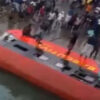NAIROBI, September 8 – Located along Nairobi’s Slip Road, the Maasai market is the ultimate outdoor shopping bazaar in Kenya. It provides a unique display of curios, artifacts, ornaments and other African carved items.
The concept was borne in the early 70’s. At the time, the traders did not have a specific area from which to sell their wares; they operated from City Market and at the African Heritage shop- the largest Pan-African art gallery that was co-founded by Joseph Murumbi, Kenya’s second Vice President, and Alan Donovan.
“We used to sell the items to Asians. At the African Heritage, we were allocated a line from where we paraded our goods,” explains Joyce Kanini Ndungu, Chairperson Maasai Market Mapatano Self-Help Group.
“If supplies remained, Murumbi used to allow the women to sell from outside,” she adds.
This went on until the early 80’s when the group (mainly comprised of women) moved to Monrovia Street outside Maendeleo House.
However, this was short-lived; a fire destroyed the building and so the traders relocated to an area outside Nyayo House.
“After a few years we were allocated the present spot.”
That is when Maasai Market shot to the limelight and its full potential became evident. The market operates on Tuesdays.
The emergence of shopping malls in Nairobi has also been a blessing to the craft traders; they have designated ‘maasai market’ days as part of their marketing strategies.
“There was a manager at the Village Market known as Ng’ang’a who approached us in May 1997. He wanted us to promote the Village Market on a Friday and we agreed to the concept,” Kanini informs.
“It worked. The Village Market became prominent and we started going there every Friday.”
She says initially they had 22 groups representing traders at the busy Maasai market and they chose 15 people from each group to be selling at the village market on Fridays.
“They were later reduced to 10 people per group and we paid Sh1, 500 as membership fee and another Sh800 every end of the month.”
Another group, she says, operates from the Yaya Centre every Sunday, another from Capital Centre every Wednesday.
On Saturdays, the Maasai Market is located outside the Nairobi Law Courts.
“We opened another one on 18th of August at Crossroads Karen shopping centre where we will be going every Monday.”
The market that now has more than 1,000 registered traders has not been without its share of challenges, the greatest of them, according to Kanini, being unscrupulous middlemen.
“They come with paper, pen and calculators and start selling our products which is often by force. They don’t use polite language with our customers,” she laments.
”If, for example, this leather bag costs Sh300 they would sell up to Sh3, 000 and it had reached a point where our customers were saying the market is expensive.”
She however says for the last two months this has not happened since the City Council acted on the issue.
“I also went round and told the traders that if any of them gave the brokers money, they would be breaking the laws of the market.”
The other main challenge, she mentions, is the issue of imitations from China.
Kanini claims there are people who come from China with cameras, take photos of the artifacts and then bring imitations.
“Every time we have a new design they imitate and sell them here in the country and that is affecting our business,” she says.
She advises business people to sell Kenyan art rather than that of China, which is bringing down their work at the Maasai market.

































